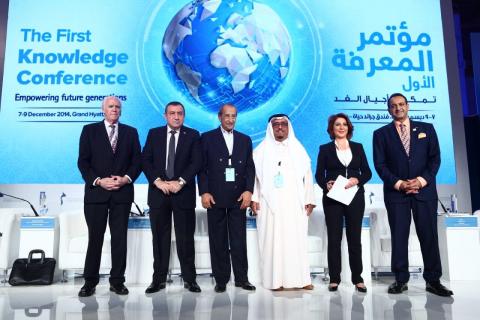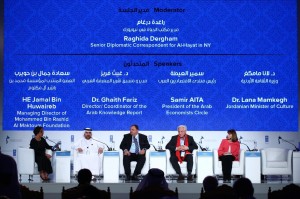
- Experts and knowledge influencers at First Knowledge Conference discuss roadmap for Arab Knowledge Index
Dubai, United Arab Emirates, December 9, 2014: The instability represented by the Arab Spring and the rise of extremism in the region are the direct outcomes of current inadequacies in the education system in Arab countries, experts said on the concluding day of the First Knowledge Conference in Dubai.
Organized by Mohammed bin Rashid Al Maktoum Foundation (MBRF) on the theme ‘Empowering Future Generations’, the conference, the first event of its kind in the region, was organized from December 7 to 9, 2014.
Speaking at a highly engaging session on the status of Arab knowledge in light of the Arab Spring, the panelists stressed the need to build human capital and support youth empowerment with the right knowledge that meets the future requirements of the market.
Dr. Essam Sharaf, former Prime Minister of Egypt, pointed out that the Arab region has a problem about differentiating between homeland and the country. “Politics changes but the homeland remains constant. Inadequacies in this knowledge have created a vacuum in national identity leading to extremism,” Dr. Sharaf said.
Riz Khan, prominent television journalist, said Arab Spring involved a lot of emotion and as a result information could not be correctly visualized. Adding to the problem, the popular medium of information, social media, is also driven by emotion, he said.
Analysing the situation in the wake of Arab Spring, Khan said, “Constant uncertainty has an impact on the education system. This leads to unavailability of teachers and brain-drain, affecting the knowledge arena severely in the long term. The resultant disillusionment among the youth creates radical thinking.”
H.E. Lt. General Dhahi Khalfan Tamim, Deputy Chairman of Dubai Police and Public Security, said: “The Arab world needs to revive the instinct for exploratory knowledge which was the hallmark of the earlier generations. Exploratory knowledge enabled our forefathers to depend on their own efforts rather than depend on the expertise of other countries.”
Prof. Peter Giblin, Member of the Board of Trustees of the American University in Cairo, said the right kind of knowledge is a combination of information and judgement. “Judgement is critical thinking. The Arab Spring created a lot of euphoria and led to unfulfilled expectations and pain. It is important to develop critical thinking in youth,” Prof. Giblin said.
Prominent Egyptian journalist Hamdy Kandil said he was optimistic about the situation and expressed the opinion that eventually it would be possible to engage the Arab youth with the right knowledge. What is urgently required is the real will on the part of the governments in the region, Kandil said.
Another engaging session on the concluding day discussed the imperative for an Arab Knowledge Index and a roadmap for developing and using the index. The Arab Knowledge Index is being jointly developed by MBRF and the United Nations Development Programme.
Speaking at the session, H.E. Jamal Bin Huwaireb, Managing Director of MBRF, said “The Arab Knowledge Index will provide regional policy and decision-makers accurate information about the level of knowledge in Arab communities, as well as highlight the areas of focus for further development plans.”
Explaining the purpose of the index, Dr Ghaith Fariz, Director Coordinator of the Arab Knowledge Report, said: “An index can be regarded, in simplistic terms, as a traffic signal. It is meant to provide an accurate image of ground realities, and then to guide policy makers to move in the right direction on specific issues that are highlighted. An index for this region is crucial so we can examine what is needed and prioritise accordingly.”
Dr Samir AITA, President of the Arab Economist Circle, emphasised the need for an inclusive index that takes into consideration the disparity and specific needs and challenges of different countries in the Arab world. “The index must take into account that every country in the Arab world has differing levels of progress and fields of success as well as unique issues and development challenges.
Addressing the session, Dr. Lana Mamkegh, the Jordanian Minister of Culture, spoke about the gaps created by an increasingly technology-oriented education among youth. “Our youth today need more avenues of open-ended learning, instead of limiting their learning through devices and technology alone. This will stimulate their imagination, leading to innovation and better productivity.”
The First Knowledge Conference brought together more than 40 international speakers and 1,500 local, regional and international influencers and experts in the field of knowledge to discuss the most critical issues related to knowledge transfer and localization and explored potential solutions to decrease the prevailing knowledge gap in the region.
Categories
- Log in to post comments
